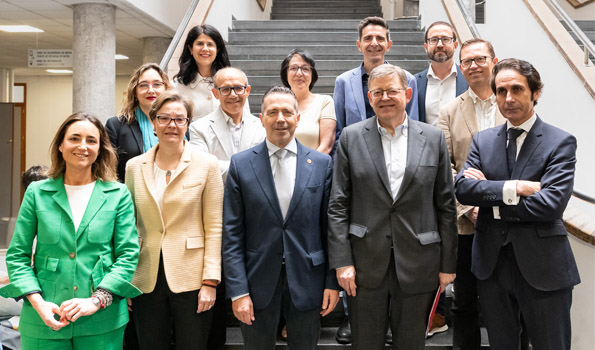Global communication faces a major challenge
The OECD chooses the UPV to present its global report on improving resilience in telecommunications networks
[ 19/05/2025 ]
The School of Telecommunications Engineering at the Universitat Politècnica de València (ETSIT-UPV) has been chosen by the Organisation for Economic Co-operation and Development (OECD) as the venue for the global presentation of its report Enhancing the resilience of communication networks.
The report highlights the fundamental role of resilient communication networks in a world increasingly dependent on connectivity. It describes the challenges facing policymakers in protecting networks from system failures, malicious actions and natural disasters.
Key strategies for improving resilience include energy redundancy, diversity of connections and the adoption of innovative technologies such as cloud integration, artificial intelligence and software-defined networks.
The report also emphasises the value of organisational measures, such as crisis drills and business continuity management, and provides a comprehensive overview of current policies in OECD member countries, focusing on infrastructure improvement, disaster preparedness, transparency, technological innovation and emergency communications.
In addition, the study provides ideas for shaping robust policies that strengthen network resilience, including harmonising resilience parameters and promoting collaboration and information sharing between operators, emergency services and other stakeholders. Finally, the report also highlights the need for continued investment in infrastructure and the adoption of emerging technologies to improve network resilience.
José E. Capilla: ‘The resilience of communication networks is not only a technical challenge, but also a strategic challenge for our increasingly digitalised societies.’
The Rector of the UPV, José E. Capilla, and the Ambassador and Permanent Representative of Spain to the OECD, Ximo Puig, welcomed participants to an event attended by Jerry Sheehan, Director of Science, Technology and Innovation at the OECD; Inmaculada Cava Ferreruela, Policy Analyst at the Connectivity Services and Infrastructure Unit, Directorate for Science, Technology and Innovation; Luke Kehoe, Industry Analyst at Ookla Europe; Carmen Sánchez Muñoz, Director of Regulation and Public Affairs at DigitalES; Daisuke Yamakawa, Member of the Office of Multilateral Economic Affairs at the Ministry of Internal Affairs and Communications of Japan; and Marta Balenciaga Arrieta, Dean of the College of Telecommunications Engineers of Spain.
During his speech, Capilla highlighted the UPV's outstanding track record in research and education in the field of telecommunications, noting that the iTEAM Institute ‘has carried out more than 1,300 R&D projects and published more than 1,600 scientific articles in the last two decades, reflecting its solid and internationally recognised research capabilities’. In addition, the Rector highlighted that ‘the ETSIT-UPV has been training highly qualified professionals for more than 30 years, contributing to technological development and innovation in this strategic sector’.
The Rector emphasised that ‘the resilience of communication networks is not only a technical challenge, but also a strategic challenge for our increasingly digitised societies’. In this regard, Capilla added that ‘the UPV, as Spain's leading technological university, is firmly committed to this objective, from the training of professionals to the generation of cutting-edge knowledge’.
Finally, the Rector thanked the OECD for its trust and highlighted the fact that the institution had ‘chosen the UPV to host the global presentation of this report, which reinforces our role as a global player in the development of secure, robust digital infrastructures at the service of the common good’.
The OECD, a joint response by 38 countries to the challenges of globalisation
The OECD is an international intergovernmental organisation in which member countries - currently 38 - work together to respond to the economic, social and environmental challenges arising from interdependence and globalisation.
Created after the Second World War under the name Organisation for European Economic Cooperation (OEEC) with the aim of coordinating the Marshall Plan, in 1961 it was renamed the OECD, initially with a transatlantic focus and later with a global character.
Carlos Ayats Pérez / UPV Communication Area
Outstanding news
 The Diamond Army
The Diamond Army
Two students came up with the UPV initiative that has engaged more than 1,600 volunteers and shattered the false myth of the 'crystal generation'
 ARWU 2024
ARWU 2024
The Shanghai ranking reaffirms the UPV as the best polytechnic in Spain for yet another year
 Distinction of the Generalitat for Scientific Merit
Distinction of the Generalitat for Scientific Merit
Guanter has been distinguished in recognition of his research excellence in the development of satellite methods for environmental applications
 The new statutes come into force
The new statutes come into force
The Universitat Politècnica de València is the first university in Spain with statutes adapted to the new LOSU
 NanoNIR project against breast cancer
NanoNIR project against breast cancer
UPV Researcher Carla Arnau del Valle receives an EU Marie Curie grant to develop biosensors for the early detection of this cancer
 Large artificial intelligence language models, increasingly unreliable
Large artificial intelligence language models, increasingly unreliable
According to a study by the Universitat Politècnica de València, ValgrAI and the University of Cambridge, published in the journal Nature





